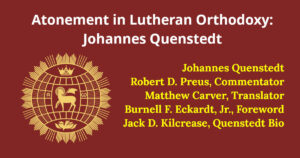Some of you remember. Before 1971, television had cigarette advertisements. After that, the ads were banned.
The jingle for one brand went, “Over, under, around, and through; Pall Mall travels pleasure to you.” The video showed smoke passing over, under, around, and through tobacco to the smoker. This illustrates something that happened to Jesus in Gethsemane.
There, Jesus said, “My soul is exceedingly sorrowful, even to death.” (Matthew 26:38; Mark 14:34) The Greek word translated “exceedingly sorrowful” is perilupos. The second part of that word speaks of sorrow. The first part, peri, tells where the sorrow was. It was over, under, around, and through. Grief both surrounded and penetrated Jesus.
Jesus became “deeply distressed,” “very heavy,” or “full of heaviness.” (Matthew 26:27; Mark 14:33). The Greek here is ademoneo, the strongest word in the New Testament for depression. It means “sated to loathing.”
Sate simply means satisfying an appetite or desire to the full. After eating four pieces of cake with ice cream, you don’t feel like having more. If something forced you to eat more, you would go past being sated to loathing cake and ice cream. You would be full of heaviness. This heavy fullness amplifies that sorrow was over, under, around, and through Jesus.
Something glutted Jesus into severe depression by overfilling his mind. It was worse than tobacco, more toxic than tar and nicotine. It was our sin. Jesus loathed it and was saving us from it.
The atonement was under way in Gethsemane. Our sins were being laid on him as a sacrifice to reconcile us to God. This was a judicial assignment by God of our sin to him so that He, as our substitute, could satisfy God’s judgment for us. This assignment caused him to feel our sins in his conscience as if they were his. This does not mean He sinned. It means substitution, by his sympathy for us, went that far.
As sinners, we are dull or numb to sin. It takes a holy person to feel sin, to loath it, to be weighed down by sin into depression. Because Jesus is the only holy man, He is the only man who really felt sin.
These truths may weigh our hearts down, as they should. But take heart. God has brought joy from sorrow. The resurrection of Jesus shows that, though He suffered the sentence of death for our sins, He triumphed over sin and death. He can assign to us his holiness and life the way our sin and death were assigned to him.
As the assignment of our sins to him had an effect in his conscience, the assignment of his righteousness to us has an effect in our conscience. While the sacrifices of the Old Testament could not perfect the consciences of the worshipers (Hebrews 9:9), they pointed to Christ. Christ’s sacrifice cleanses and purifies our consciences by his blood (Hebrews 9:14; 10:22), and by his resurrection (1 Peter 3:21). Christ absolves us and gives us peace.




